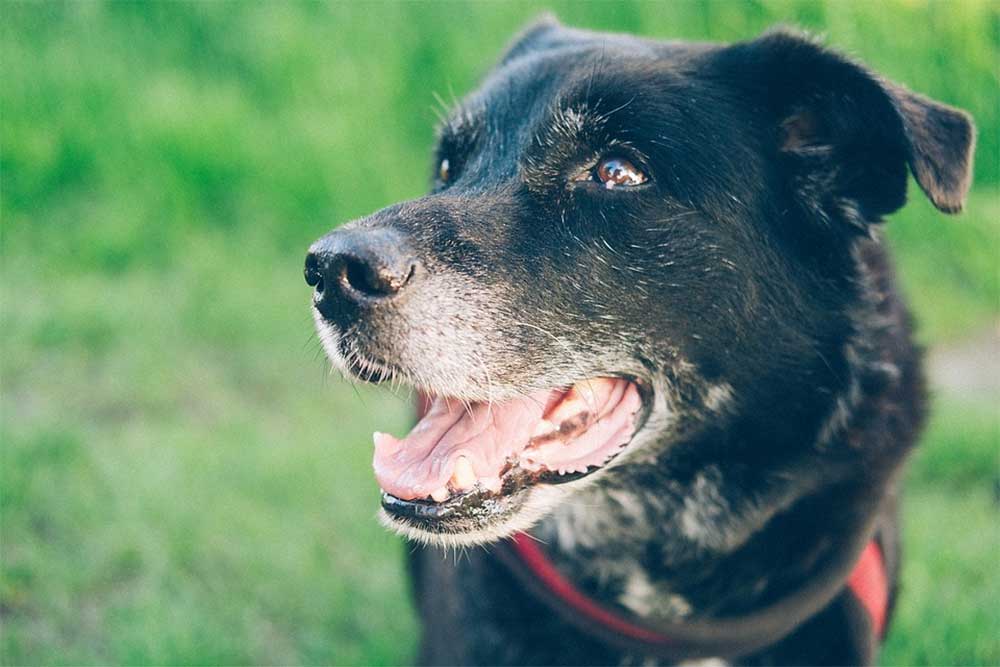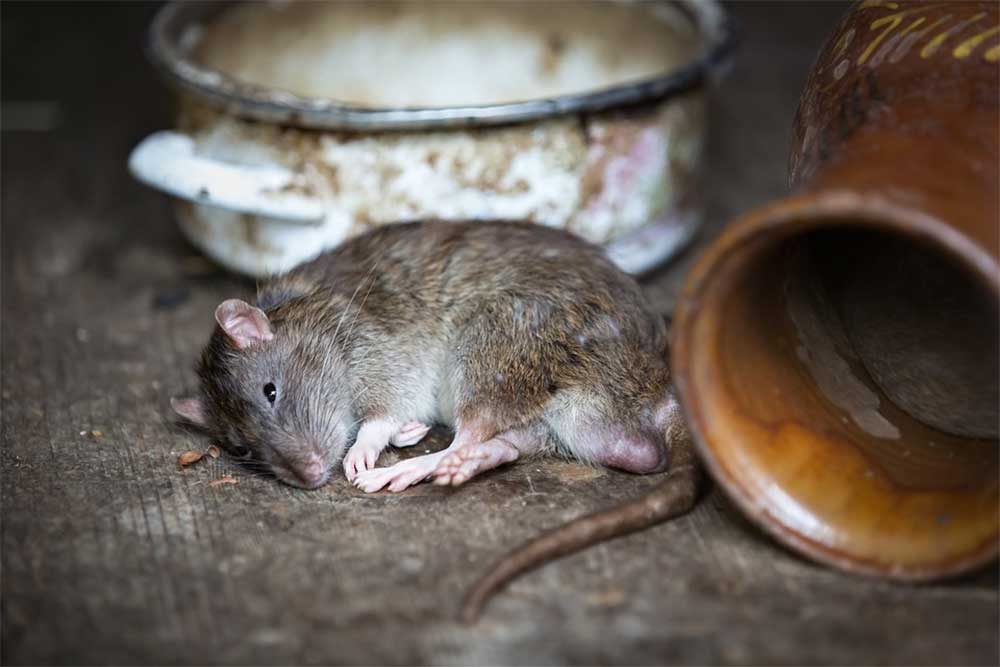Rats are pests, and once you have them in your home they can be very hard to get rid of.
We have recently had a rat problem in our kitchen and discovered that they had been coming through a hole under the sink.
There’s nothing more unnerving than hearing scurrying in the walls, so I’ve had to call the pest control company to get them to put poison down which had me wondering what this could mean for our dog, Bennie. Primarily, I had the thought: can a dog get sick or die from eating a mouse or rat that has been poisoned?
Considering how much my dog loves nothing more than to scavenge anything he can get his paws on and is constantly sniffing around for food, the idea that rat poison can kill dogs is a hugely worrying thought to me. That being said, I decided I needed to do some research, and am sharing all that I learned about dogs and mouse or rat poison so that dog owners are more aware of the risks when using it in or around their home.
Keep reading to find out what I discovered.

Does rat poison kill dogs?
Rat and mouse poisons, also known as rodenticides, are products formulated to kill rodents. However, if you’re a dog owner, you need to be aware of the risks of these rodenticides when calling pest control.
The chemicals used in these products are often highly toxic to dogs and can cause internal bleeding, kidney failure, organ damage, and even death if they are eaten by your dog. Bearing this in mind, when you have animals around the house, leaving rat poison around is not to be taken lightly.
This primarily comes down to the fact that many modern rodenticides have a palatable flavor in order to entice the very animals that they’re designed to kill. The issue with rat poison lies in the reality that while it is left out in the open to catch rodents, it could also kill other animals that come into contact with it. There’s no way to put it nicely, and it’s important that you’re aware that any curious or unsuspecting dog could stumble upon the poison that you’ve bought or had pest control place in and around your home, and could therefore look like a delicious snack to your pooch.
If your dog eats rat poison or eats a poisoned mouse or rat (secondary poisoning) then there is a high risk that they will become sick and possibly even die.
Are dogs attracted to poison?
Yes, as I mentioned above dogs can be enticed to eat poison in the same way that rats are. Rodenticides are designed to have a pleasant flavor, color, and smell to mimic a tasty snack and therefore encourage your dog to eat it if it has been left out for an unsuspecting rat.
Dogs are naturally curious beings and have a sense of smell said to be 100,000 times stronger than a human nose. If you think about it, the first thing that dogs always do when presented with something new is to suss it out with their nose. Bearing this in mind, then, if you place something out of the ordinary into their environment, they will sniff around it and potentially try to eat it. It’s just in their nature.
As a result, it is your responsibility as their owner to ensure that you do not leave poison out around your dog. Whether that means you need your dog to stay with a friend or family member while pest control is treating your house for rats or keeping them strictly in a part of your house that means they can’t get to the poison, it is better to be safe than sorry.
You can bet if poison is around, your curious pup will want to sniff, lick, or eat a potentially lethal dose of poison. Monitoring your dog 24/7 of the time is not a viable option, as there will always be times when your back is turned. That being said, you need to take the proper precautions to ensure that your dog is not at risk to the rat poison that is being used to control the rat problem in and around your home, as you could end up killing more than just rats.
How does rat or mouse poison kill a dog?
There are four main types of commercial rodenticides available on the market, none of which are safe for dogs to ingest.
- Anticoagulant rodenticides – These poisons can result in your dog having internal bleeding, cause vomiting, coughing of blood, and blood in their feces and urine. That being said, you might not see poisoning symptoms for up to 3 to 5 days after your dog has ingested it.
- Bromethalin – Bromethalin stops the cells in the central nervous system from producing energy. Causing the nerve cells to swell, this poison puts pressure on the brain, and paralysis and death soon follow within a few hours.
- Cholecalciferol – This rat poison is vitamin D3 based and can result in your dog suffering acute kidney failure. Toxic doses of cholecalciferol lead to too much calcium in the blood, which can affect the central nervous system, muscles, the gastrointestinal tract, cardiovascular system, and kidneys. Just a small amount can be lethal to a dog, and it’s incredibly difficult for vets to treat.
- Zinc and aluminum phosphides – These poisons release phosphine gas which is very toxic, blocking the body’s cells from making energy, and the cells die. Phosphine exposure is particularly damaging to the heart, brain, kidney, and liver.
How much rat poison is lethal if your dog eats it?
No matter how much rat poison you think your dog has ingested, it is crucial that you call your veterinarian immediately. This situation is always an emergency, as even a small amount of poison can be lethal if your dog is left without medical attention. Failure to do so will essentially result in you playing Russian roulette, and it is not a risk that you want to take.
There are too many variables to know an accurate answer to how much rat poison is lethal to your dog. The reason why it’s so difficult to judge how much rat poison will kill a dog is due to factors that include:
- How much poison your dog has ingested.
- The size and age of your dog.
- Any health conditions that your dog may have, including underlying health conditions.
- Whether your dog has secondary poisoning from eating a poisoned rat or mouse.
- The type of poison used and how long ago they ate it, as some poisons are more toxic and work more quickly than others.
That being said, if you suspect your dog has eaten poison, you always need to treat it as an emergency due to this uncertainty. This way, you have the best chance of ensuring that your dog survives and that they receive the best possible care if they have ingested poison. As I’ve said, poison is highly toxic and can be lethal so the chances of them being incredibly sick are high, so you don’t want to contribute to that by waiting to take them to the vet.
Can a poisoned rat kill a dog if they eat it?
In short, yes a dog eating a poisoned rat can lead to severe sickness and can be lethal. When a dog ingests the poisoned rat, the poison enters their system and is known as secondary poisoning.
In the majority of cases, a dog will become incredibly sick if they eat a poisoned rat, but it can be lethal depending on the variables as I suggested above. You can never be sure how your specific dog is going to react to the particular poison, and so you should always contact your veterinarian as soon as you can to seek the appropriate care for your dog.
For instance, while you might have a larger sized dog that becomes severely sick from eating the poisoned rat, the same amount of poison could kill a smaller sized dog.
If your dog eats rat poison and you can’t afford a vet, there are some charities in both the UK and America who might be able to help with your vet’s bill. It’s crucial that you get your dog the help they need as soon as possible, so don’t let the prospect of an expensive bill keep you from seeking urgent veterinary help, your dog’s life could be a risk if you don’t.
So, what are some of the signs to look for if you’re suspicious that your dog has secondary rat poisoning?
Signs of secondary rat poisoning
- Difficulties breathing.
- Blood in their urine or feces.
- Collapsing.
- Bleeding nose.
- Bruising on their body.
- Vomiting.
- Diarrhea.
- Coughing.
- Excessive urination.
- Pale or bleeding gums.
- Paralysis.
- Seizures.
- Lethargy.
- Decreased appetite.
- Halitosis.
- Swollen joints.
- Tremors or shaking.
- Increased thirst.
Although this is a wide spectrum of symptoms, it is highly important that you recognize the signs if you suspect that your dog has ingested rat poison through eating a rat.
How do you keep your dog safe if you’re using rat poison?

If you take anything away from this information, it’s that dogs and rat poison should never, ever be kept near to each other. You should also clean up any dead rats or mice that you see which have been poisoned before your dog can get to them and potentially eat them as they could experience secondary poisoning.
To ensure that your dog is safe from eating a poisoned rat or mouse, you can try the following:
- Use alternative methods to poison in order to get rid of the rats, such as using human traps.
- Employ a professional pest control company.
- Keep your dog away from the area that you are poisoning the rats, whether that means keeping the door consistently shut or ensuring that they’re never allowed in whilst there is poison around.
There is no such thing as a dog-friendly rat poison. If the poison can kill a mouse, it can kill a dog, too, so it is your responsibility to ensure that your dog is nowhere near the poison that you’re using. However, there are alternatives to rat poisons that won’t kill your dog, such as glue traps that catch instead of kill the rats.
In summary
When using rat poison, make sure that you’re not taking any chances with your dog’s health and life.
It is highly toxic and a small amount ingested by your pup can either seriously harm or be lethal to your dog, even if they eat a poisoned rat and get secondary poisoning.
Be safe and take care of your pooch!
